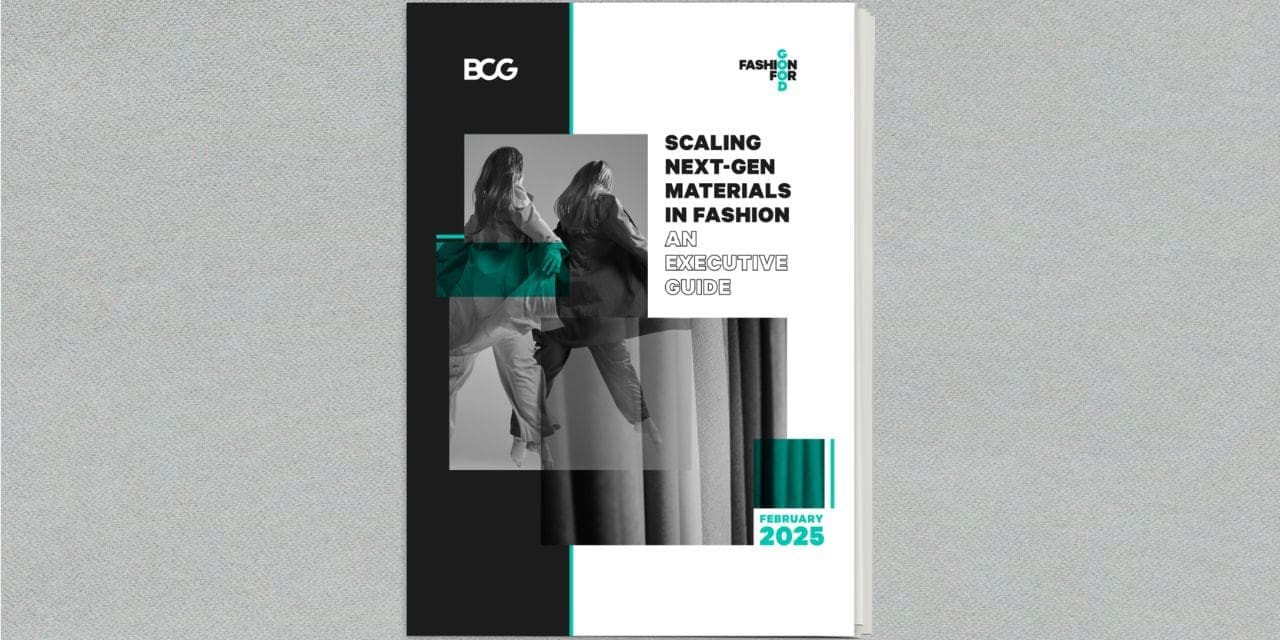Fashion for Good and Boston Consulting Group (BCG) have released a groundbreaking new report, “Scaling Next-Gen Materials in Fashion: An Executive Guide,” offering strategic insights for industry leaders looking to drive the adoption of next-generation materials. The report emphasizes the critical need for individual and collective action across the fashion supply chain to unlock the full potential of these sustainable materials.
Key Insights from the Report:
Materials are at the core of the fashion industry, responsible for 92% of the industry’s total emissions through their extraction, processing, and production, and about 30% of the cost of goods sold (COGS). With next-gen materials offering the potential to reduce environmental impact and transform the industry’s economics, many brands are still underprepared for this transition.
The report predicts that next-gen materials could represent 8% of the total fibre market by 2030—equivalent to approximately 13 million tons. While this is a significant increase from the current 1%, it may still fall short of the demand driven by evolving consumer preferences, climate-related disruptions, and regulatory pressures.
Strategically adopting these materials could result in a 4% reduction in COGS over five years, showcasing the financial incentives for brands to act now in order to remain competitive in a rapidly changing market.
Katrin Ley, Managing Director at Fashion for Good, commented: “The fashion industry is at a critical juncture where next-gen materials are not just an opportunity but a business imperative. The opportunity is there, but it requires decisive action across demand, cost, and capital levers to bend the adoption curve.”
Three Key Levers for Scaling Next-Gen Materials:
The scaling of next-gen materials faces several challenges, including financial, technical, and operational obstacles. The report identifies three primary levers for overcoming these barriers:
- Demand: Consistent demand signals can stabilize markets. Demand pooling and transition financing are key to overcoming adoption barriers.
- Cost: Process optimization and cost engineering across the supply chain can unlock economies of scale, making materials more affordable and accelerating adoption.
- Capital: Strategic financing that aligns with each phase of the adoption curve is necessary to ensure sustained growth and scaling potential.
Successful integration of next-gen materials into a brand’s core strategy requires a thorough understanding of the current material mix, supply chain, and external ecosystem to mitigate risks while seizing long-term opportunities.
Sebastian Boger, global leader of BCG’s Fashion & Luxury sector, stated: “Scaling next-gen materials is not just about sustainability—it’s about staying relevant in a shifting market. These materials won’t scale on their own, and industry-wide collaboration is essential.”
The Road Ahead for Fashion:
As the fashion industry navigates this pivotal transition, Catharina Martinez-Pardo, Managing Director and Partner at BCG, emphasized: “The transition to next-gen materials presents both a challenge and an opportunity for the industry. Brands that embrace these materials now will lead the next era of fashion.”
ABOUT FASHION FOR GOOD
Fashion for Good is at the forefront of collaborative innovation in the fashion industry. Its Innovation Platform connects brands, manufacturers, innovators, and funders to transform the industry by bringing new ideas and technologies from niche to norm. Supported by founding partner Laudes Foundation, co-founder William McDonough, and industry partners such as adidas, Kering, Levi Strauss & Co., Patagonia, and Zalando, Fashion for Good works to accelerate sustainable change across the sector.
ABOUT BOSTON CONSULTING GROUP
Boston Consulting Group (BCG) partners with leaders across business and society to tackle critical challenges and capture opportunities. A pioneer in business strategy since 1963, BCG works closely with clients to embrace transformational approaches that deliver positive societal impact. With deep expertise and a global network, BCG helps clients build sustainable competitive advantages and thrive in a constantly evolving world.

